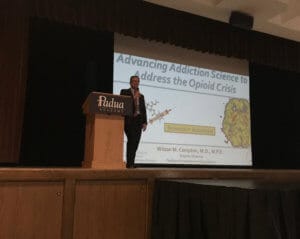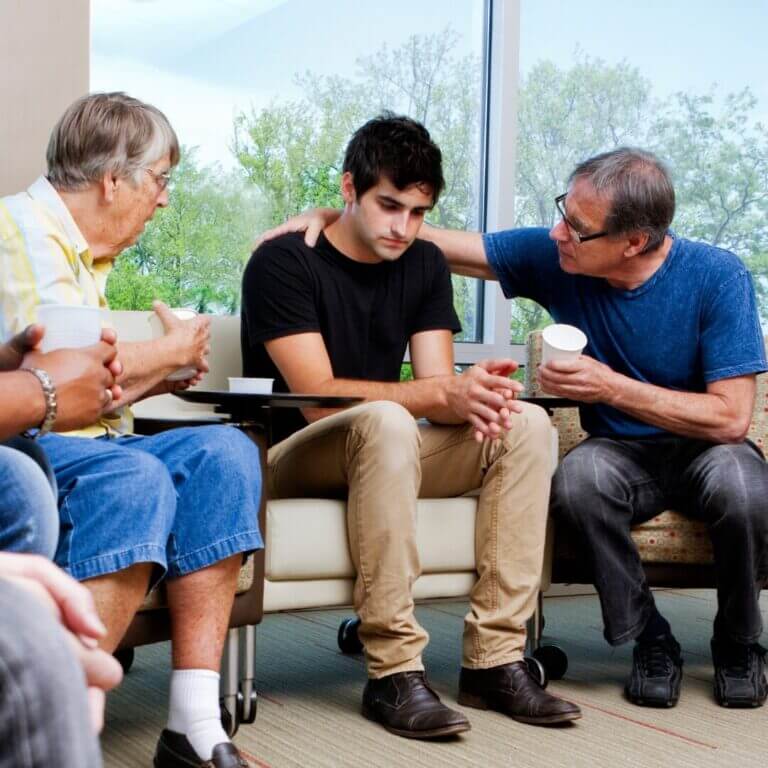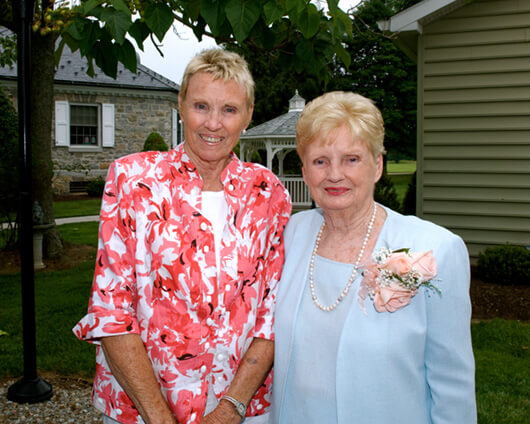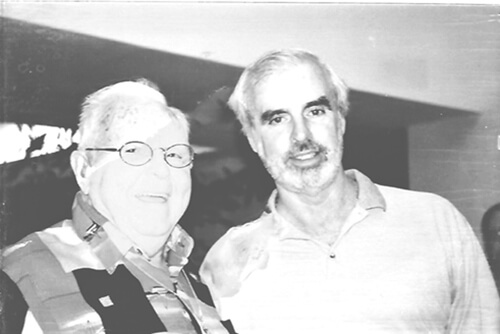Latest Happenings from the Advancement Team at Ashley
The dark days of winter have done nothing to slow us down at Ashley, and we thought you might like to know about some of the latest happenings, both on campus and in your community. In this issue of eNews, we’ll also share some insights into complementary therapies often used in recovery. And don’t miss the 2nd of 12 monthly installments discussing the 12-Steps.
Our first major fundraising event of the year is fast approaching, as our annual Gala in DC will be held on Thursday, February 22nd. We held Strengthening Our Recovery and other speaking events in January in Annapolis, Wilmington and Washington, DC, and have another coming in February in Baltimore.
In addition to this, the Alumni and Community Services team held our quarterly RED Program on January 20th, as more than 60 attendees learned to connect, release and rejoice through mindfulness movement.
Lastly, don’t miss the inspiring story of the Ashley Young Adult Leadership Council’s service work in Cecil County Maryland – their work truly embodies the idea of “Everything for recovery, because recovery is everything!”
Clinically Speaking
Complimentary Therapies in Recovery
 At Ashley, we often say, “everything for recovery because recovery is everything.” From a treatment perspective, this means we believe in a full toolbox, incorporating a wide variety of treatment modalities to address a complex, multi-faceted disease.
At Ashley, we often say, “everything for recovery because recovery is everything.” From a treatment perspective, this means we believe in a full toolbox, incorporating a wide variety of treatment modalities to address a complex, multi-faceted disease.
There is no single pathway to recovery – different people respond to different approaches. What works for one individual may not work for another. This is why an individualized, holistic recovery plan that draws on both traditional and complementary therapies offers the best possible outcomes.
Complementary therapies have numerous benefits for people in recovery, according to a study by the National Association of State Alcohol and Drug Abuse Directors. They improve engagement and retention in treatment, they help develop essential skills to reduce the risk of relapse, and they can improve one’s overall health and well-being. Some of the benefits include stress relief, greater spiritual awareness, improved mood, improved social functioning, and decreased symptoms of mental illness.
Following are some examples of effective complementary therapies that can enhance your recovery and improve your life across all domains:
Art Therapy is one of the most common complementary therapies used in addiction treatment today, with nearly 37% of programs integrating it into their curriculum. Art therapy allows you to express yourself through creative exercises that help you make sense of difficult emotions and experiences. Creating art provides a non-verbal way to tell your story, moving you away from an internal, contemplative state into an external, active state. This helps improve communication skills and promotes self-reflection.
Music Therapy promotes a positive emotional state and counters emotions like anger, depression, anxiety and stress. It has also been found to increase motivation to engage in recovery-oriented activities and promotes effective self-expression. Listening to music, moving to it, and even creating it help participants engage on a variety of levels.
Research shows that Massage Therapy results in a significant reduction in symptoms associated with depression, anxiety, and chronic stress, and can promote high-quality sleep. There are a wide variety of effective massage techniques, including Shiatsu, Swedish massage, Reiki, Indian head massage, and more, all of which help to ease muscle tension and improve blood circulation.
These are just a few of the many and varied complementary therapies proven effective in enhancing recovery. The lessons learned and skills gained while engaging in these complementary therapies often extend beyond the addiction and help you improve other areas of your life. Try them out and find which ones work best for you!
Development
4th Annual DC Gala
Sponsorships and tickets remain available for our first major fundraising event of the year. Come join us on February 22nd, 2018, for our 4th Annual DC Gala hosted by the Ashley Washington DC Leadership Council, held at the beautiful DC Four Seasons Hotel.
Our event will be emceed by award-winning author, Susan Cheever and will include our public introduction of new Ashley President & CEO, Rebecca J. Flood. In addition, we will honor philanthropist and friend of Ashley, Ginny Grenham. Ginny works with non-profits in the areas of mental health and addiction, childhood obesity, and literacy and the arts in underserved populations. She runs a consulting practice where she helps clients develop creative and innovative strategic partnerships with non-profit, government and community leaders. She is also the President of the PEN/Faulkner Foundation, a non-profit literary organization that promotes a lifelong love of reading and a connection to writing. The PEN/Faulkner Award is one of the most prestigious honors available to American fiction writers.
This year’s Gala will also feature a private reception with the Leadership Council and Ashley executive staff, and a sumptuous, full course seated dinner. Proceeds will benefit the new Women’s Solarium at Ashley!
Women face different challenges during their treatment experience, and the Women’s Solarium will help meet many of those needs. For more information about the Women’s Solarium, click here.
Don’t miss this special annual event – for more information, click here.
The Alumni Connection
Ashley Everywhere!

Our Alumni & Community Services Department’s busy schedule continues. The Strengthening Our Recovery (SOR) speaker series arrived in Annapolis on January 10th with an interactive discussion about Romances, Finances, and Resentments: Early Recovery Pitfalls. On January 24th, Ashley’s Hannah Rose spoke about Healthy Relationships in Recovery to a packed house in Washington, DC. We were also proud to co-sponsor an important community presentation from Dr. Wilson Compton, Deputy Director of the National Institute on Drug Abuse (NIDA), in Wilmington, DE on January 24th. The topic: Science as a Solution for the US Opioid Crisis, helped make an audience of several hundred aware of local and national responses, including primary prevention, reducing excess opioid prescribing, saving lives acutely with naloxone, improved treatment and recovery services, and research to inform prevention and treatment efforts.
Closer to home, Ashley’s first Recovery Enrichment Day (RED) was held on campus on Saturday, January 20th, as more than 60 attendees learned to Connect. Release. Rejoice: A revolutionary approach to recovery through mindfulness movement. Pilates instructor Linda Carden led an interactive discussion about using basic practices, such as breathing, meditation and Pilates to connect to our higher power and our higher selves.
In other Alumni news, we are also proud to share that in March of 2017, Ashley formed the Young Adult Leadership Council (YALC): a group of alumni and friends of Ashley under the age of 35 committed to Ashley’s mission of “Everything for Recovery.” Over the past few months, the YALC has been reaching out to charitable organizations, looking for opportunities to be of service in our community. One of these organizations, The Paris Foundation of Elkton, MD, serves food to 100+ of the homeless population of Elkton every single day. Our YALC members have a monthly commitment to assist the foundation and help serve meals to those in need. We are proud to work with such an amazing organization, committed to helping the community, and offering recovery solutions and other support to those in need in Cecil County.
Look for more goings-on in the Alumni & Community Services Department in the month’s ahead, as we visit New York City, Baltimore, Wilmington, and more. For more information, visit our events webpage at www.AshleyTreatment.org/events. Come on out and see us!
Month 2 – Step 2
February continues our year-long series of articles focusing on the 12-steps. We’re taking one step per month and sharing some insights and experiences to help others with their program, as well as those working with sponsees.
Last month, we began with Step 1 – admitting we were powerless over alcohol / our addiction, that our lives had become unmanageable. With this foundation firmly in place, we are ready for Step 2:
“We came to believe that a Power greater than ourselves could restore us to sanity.”
For some of us, accepting or identifying a higher power can initially be a hurdle. Perhaps we were raised in a household with non-traditional religious views. Or maybe we once had faith and, for whatever reason, we lost our way. Regardless, we know that “the rooms” are filled with people working successful programs who struggled with the higher power concept and found a way that works for them.
Step 2 is all about opening our minds – recognizing that we, alone, could not overcome the devastation that our substance use disorder has rained upon us. It’s about hope, and the awareness that something greater than ourselves can help us find our way out of our despair.
There is often a misperception that your higher power has to be God. In truth, your higher power can be anything that you believe in: nature, the universe, Allah, Buddha, love, humanity – the list is endless. Or maybe you’re still searching for yours. In this case, allow the “group conscience” to be your higher power, leaning on the support of those who care and who believe in a sober you! There’s strength in numbers!
But the road isn’t always clearly evident even for those firm in their belief in God. Said one person in long-term recovery, “My problem wasn’t my belief in God – it was in believing that my God could or would restore me to sanity! That’s where my work really began!”
Working a successful 12-Step program doesn’t require that you believe in anything that you don’t want to; each step is merely a suggestion along the road to a sober life.
There is no “correct” or “proper” way to work the steps. Different sponsors may take different approaches. The key is to find a way that works best for you and leads to long-term, healthy sobriety!
Next month: Step 3 – Made a decision…!




